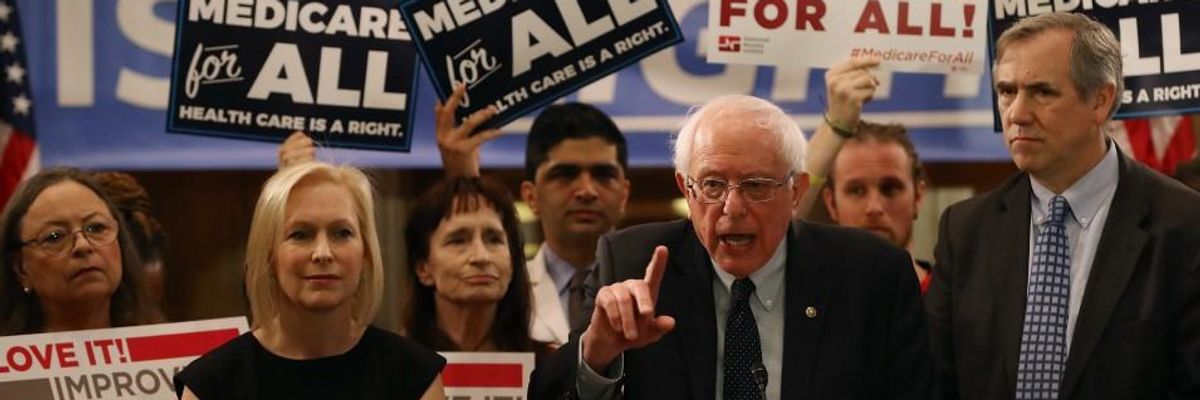Bolstering single-payer proponents' argument that Americans like and want to keep their doctors and hospitals, not their private insurance companies, a survey released Tuesday found that the majority of voters support a Medicare for All plan that eliminates private insurers if they can hold on to their healthcare providers.
"These numbers only affirm what the senator has said many times: people don't like insurance companies, they like their doctors and their hospitals."
--Sen. Bernie Sanders presidential campaign
Conducted by Morning Consult and Politico after the first Democratic presidential debates, the poll (pdf) found 55 percent of voters back a Medicare for All system that "diminishes the role of private insurers but allows you to keep your doctor and hospital."
According to the survey, 78 percent of Democrats, 56 percent of independents, and 26 percent of Republicans--averaging 55 percent overall--support a Medicare for All plan that phases out private insurance and allows them to keep their doctors and hospitals.
In a statement to Morning Consult, Sen. Bernie Sanders's (I-Vt.) presidential campaign said "[t]hese numbers only affirm what the senator has said many times: people don't like insurance companies, they like their doctors and their hospitals."
"Despite what the pharmaceutical and insurance industries will tell you," the campaign said, "Medicare for All is the only proposal that gives Americans the freedom to control their own futures--change jobs, start a family, start a business--and keep their doctor."
As Morning Consult's Yusra Murad noted, the new data shows that voters' concerns about virtually abolishing the private insurance industry "can be mitigated by clarifying that losing private insurers would not affect access to preferred providers."
The issue of whether Americans like their private insurance companies arose during the second night of the Democratic presidential debates last Thursday, when Sen. Michael Bennet (D-Colo.)--an opponent of Medicare for All--expressed support for creating a public option while upholding private insurance "for others that want to keep it."
Sanders, the lead sponsor of the Medicare for All Act in the Senate, responded by pointing out that Medicare "is the most popular health insurance program in the country."
"People don't like their private insurance companies," Sanders said. "They like their doctors and hospitals. Under our plan, people can go to any doctor or any hospital they want. We will substantially lower the cost of health care because we stop the greed of the insurance companies."
As the Washington Post's Paul Waldeman noted in a column in April, under Sanders's Medicare for All plan, "You wouldn't have to worry about losing your doctor, because with the possible exception of 'concierge' practices serving the rich, every doctor would accept it; there would be no more networks that don't include the doctors you want to see."




